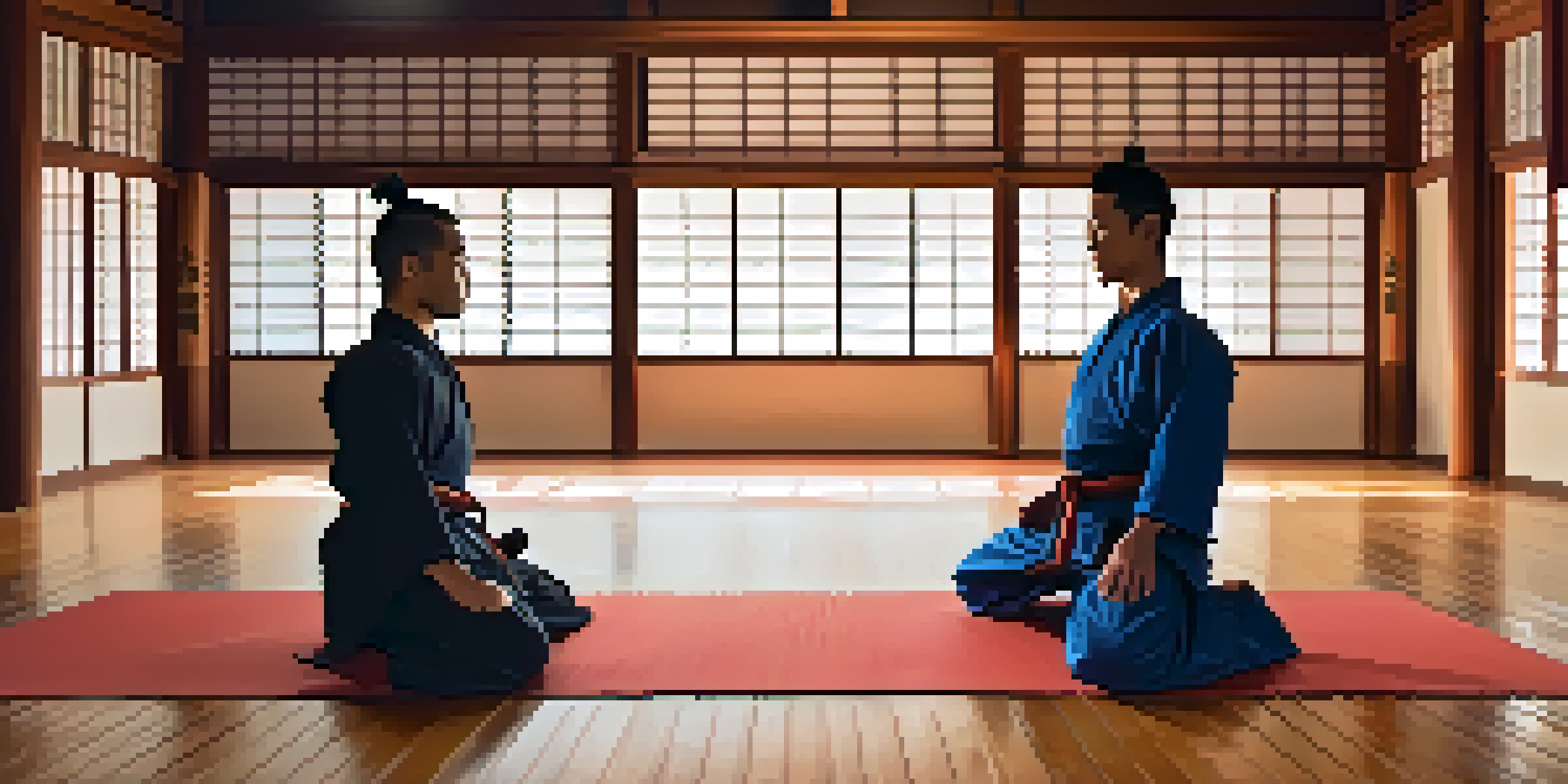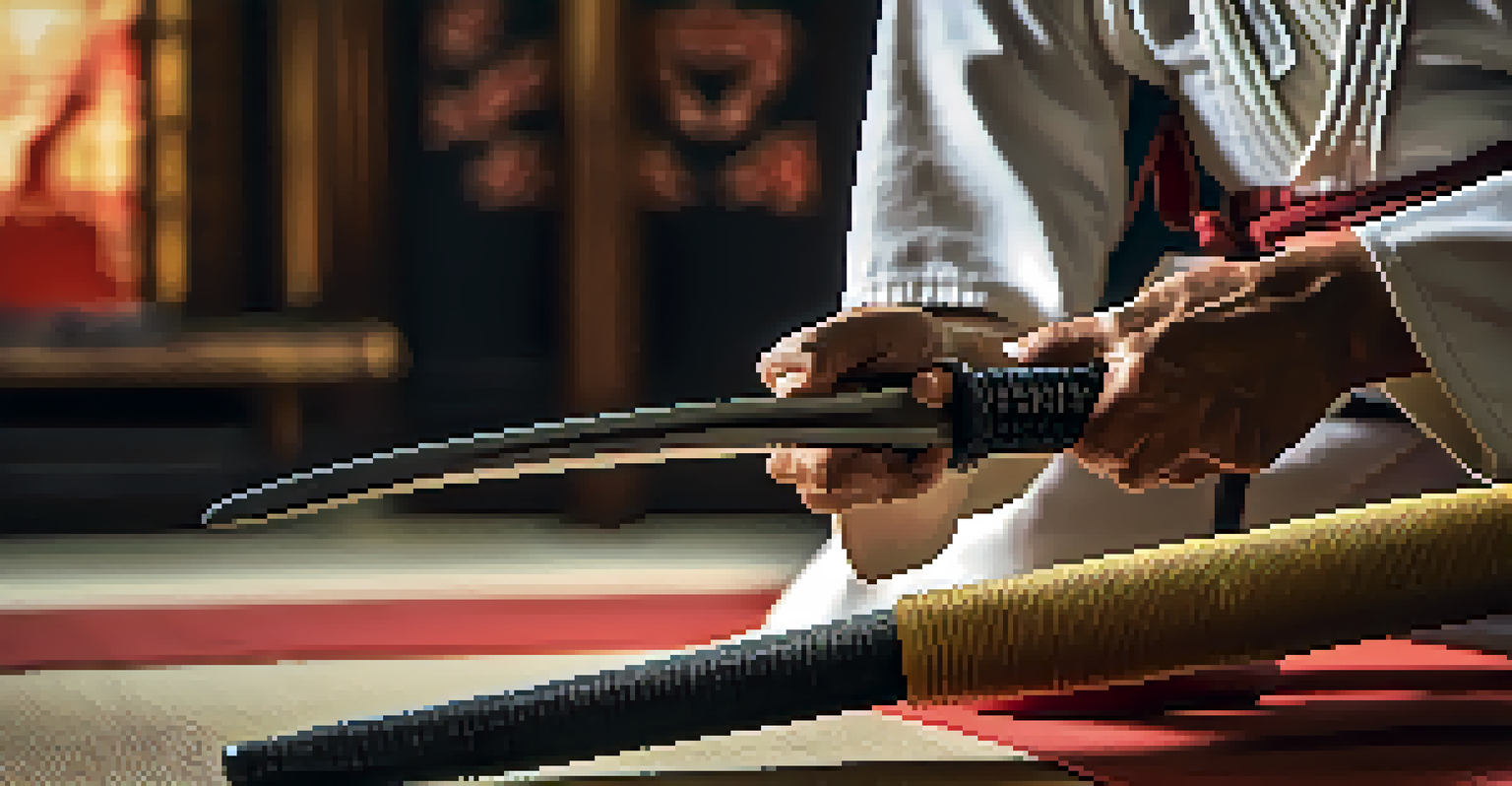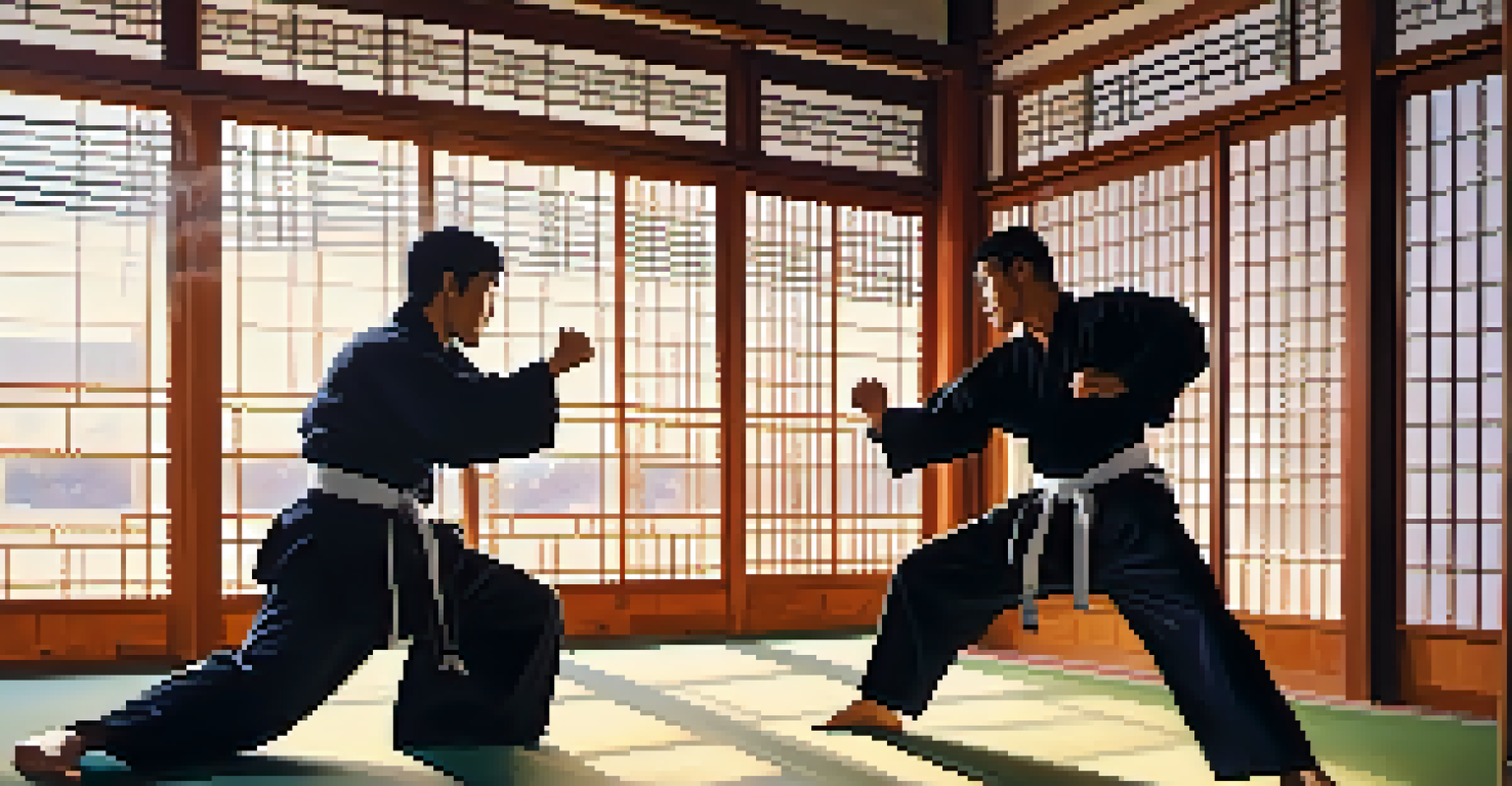The Role of Respect in Martial Arts and Personal Growth

Understanding Respect in Martial Arts Training
Respect is a cornerstone of martial arts, serving as the foundation for all interactions within the dojo. It is not just about bowing to your instructor or fellow students; it embodies a deeper appreciation for the discipline and tradition of the art. When practitioners show respect, they create an environment where everyone feels valued and motivated to improve.
The greatest victory is that which requires no battle.
This respect extends beyond the physical training; it fosters a mindset that encourages learning and growth. Students who respect their instructors and peers are more likely to absorb teachings and techniques effectively. The mutual respect among practitioners also cultivates a supportive community, which is essential for personal development.
Ultimately, respect in martial arts cultivates not only better martial artists but also better individuals. It teaches humility, patience, and the importance of valuing others, which are vital traits both on and off the mat.
The Impact of Respect on Personal Development
Respect is a transformative force that extends well beyond martial arts training; it plays a crucial role in personal growth. When individuals learn to respect themselves, they set a standard for how they expect others to treat them. This self-respect is foundational for building confidence and self-esteem, which are essential for achieving personal goals.

Moreover, practicing respect encourages empathy and understanding towards others. As martial artists learn to appreciate their peers' journeys, they foster connections that can lead to meaningful relationships. These connections are not only beneficial for a supportive training environment but also enrich one's social life.
Respect Builds Strong Communities
Respect among practitioners fosters a supportive environment that encourages collaboration and personal growth.
Ultimately, the respect learned through martial arts translates into various aspects of life, enhancing communication skills and conflict resolution. Individuals who embody respect in their daily interactions are often more successful in both personal and professional spheres.
Respecting Your Instructor: A Key to Growth
In martial arts, the relationship between students and instructors is pivotal, and respect plays a vital role in this dynamic. A respectful attitude towards instructors allows students to be more receptive to feedback and guidance, enhancing their learning experience. This respect fosters trust, which is essential for effective mentorship.
Respect is how to treat everyone, not just those you want to impress.
When students show respect, they create an atmosphere where instructors feel appreciated and valued. This positive energy can motivate instructors to invest more time and effort into their students' development. A respectful exchange enriches the entire training environment, making it more conducive to learning.
Additionally, respecting instructors teaches students the importance of authority and leadership. It prepares them for future roles in life where they may need to follow guidance or lead others, reinforcing the idea that respect is a two-way street.
Respecting Fellow Practitioners: Building Community
Respect among fellow practitioners is essential for fostering a sense of community within martial arts. When students treat one another with respect, they create a safe space for everyone to explore their limits and grow. This supportive environment encourages collaboration and camaraderie, making training more enjoyable.
Moreover, respecting fellow practitioners leads to healthy competition, which can push individuals to improve their skills. When practitioners celebrate each other's successes and provide constructive criticism, it cultivates a culture of continuous improvement. This positive reinforcement not only benefits individual growth but also strengthens the entire group.
Respect Enhances Learning Experiences
A respectful attitude toward instructors enhances students' receptiveness to feedback, leading to better learning outcomes.
In essence, the respect shared among students creates bonds that last beyond the dojo. These friendships often provide emotional support and encouragement in personal challenges, illustrating how martial arts can positively impact life outside of training.
Respecting the Art: Honoring Tradition
Respecting the martial art itself is crucial for understanding its history and principles. Each discipline carries its own traditions, philosophies, and techniques, and honoring these aspects is key to becoming a well-rounded practitioner. This respect encourages students to dive deeper into their training, appreciating the art's roots and evolution.
When practitioners show respect for the art, they are more likely to maintain its integrity and pass it on to future generations. This appreciation ensures that the techniques and values taught continue to thrive. It also instills a sense of pride in one’s training, motivating individuals to uphold the standards set by their predecessors.
In this way, respect becomes a bridge between past and present, connecting students to the lineage of their art. By honoring tradition, practitioners not only enrich their own experience but also contribute to the legacy of martial arts.
The Role of Respect in Conflict Resolution
Respect plays a crucial role in conflict resolution, both in martial arts and in life. Learning to respect differing opinions and perspectives can lead to more effective communication and understanding. In martial arts, this principle is exercised during sparring sessions, where practitioners learn to engage with their opponents while maintaining respect.
When conflicts arise, a respectful approach allows for open dialogue, making it easier to reach resolutions. Practitioners who embody respect are better equipped to handle disagreements with grace and maturity. This skill is invaluable, as it translates to everyday situations, helping individuals navigate personal and professional conflicts.
Respect Translates to Personal Growth
The respect learned in martial arts cultivates essential life skills that improve communication and conflict resolution in everyday life.
Moreover, practicing respect reinforces the idea that conflicts do not have to end in hostility. Instead, they can become opportunities for growth and learning, strengthening relationships and fostering a sense of community.
Conclusion: Embracing Respect for Lifelong Growth
In conclusion, respect is a multifaceted pillar in martial arts that significantly contributes to personal growth. From fostering relationships with instructors and peers to honoring the art itself, respect creates a rich environment for learning. By embracing respect, individuals cultivate essential life skills that extend far beyond the dojo.
As students progress in their martial arts journey, they carry these lessons into their everyday lives, shaping their interactions and personal development. This ripple effect illustrates how martial arts can serve as a powerful vehicle for self-improvement and community building.

Ultimately, the role of respect in martial arts is not just about etiquette; it is about nurturing a mindset that values growth, understanding, and connection. By committing to respect, practitioners pave the way for a fulfilling journey both on and off the mat.